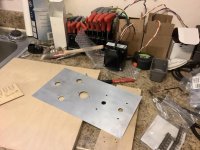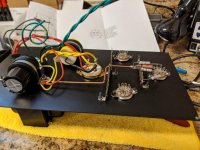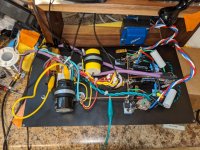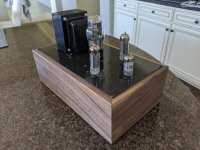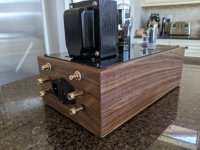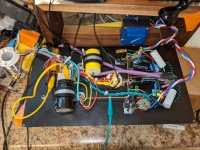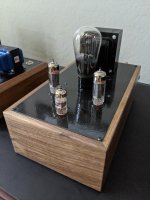For a number of years I've wanted to build a single-ended EL84. This particular design has been been built many, many times successfully: it's simple, inexpensive to build and has an interesting plate-to-plate fb scheme.(This design and it's designer have generated a fair amount of discussion over the years. I don't want to get into any of that in this thread)
There are two official versions of this amp: I built the newer, second version which employs an LM317 cathode bias scheme and the grid resistor being replaced by 21v zener. I do plan on swapping the zener with 3w power R to hear the difference.
There are a couple of BOMs posted online, so you can do a quick Google search to find those. Just beware that one BOM will be version 1 and another for version 2.
I chose the direct heated Type 80 (5y3 equivalent in a UX4 pin base) for several reasons: I buddy gave me some (Thanks Dr. Steve Curry!) and they have a high anode impedance, which may lead to a quieter supply, hence a better sounding supply. Also, I think the ST bottle is really cool looking and it's 1920's technology, with the design really beginning in late '23 and finalized as the 280 in 1927.
There's a lot of disagreement on the forums regarding types of supply and components. I won't get into that here, but the supply with the Type 80 rectifier turned out to be incredibly quite. Therefore, a quieter supply would absolutely contribute to a better sounding amplifier.
The are two downsides of the Type 80: it dissipates a very large amount of energy, making it incredibly inefficient. Therefore, you need to consider the heat output in your layout or how that will work in your environment. Living in Arizona this is a factor. I do run a very quiet ceiling fan in my audio room that helps tremendously during summer months, however, this will end up being a winter amplifier. I needed to use PSUD and get some advice on Vdrop: The Type 80 has a very high voltage drop (at least 60vdc), hence lower power output. I chose an over-sized Hammond 273BX, which has 700Vac center-tapped secondaries. I think that 650Vac center-tapped would have been just adequate. I did have to reduce my B+ some 45 volts. In any case, the RH84 circuit presents approx. 100mAh load, therefore, there was plenty of current delivery for the audio circuit!
During this time period, I read Morgan Jone's book and I highly recommend it, it's a fabulous read. I've built a lot of SS amps, but this was my first tube amp from scratch. So, I needed some help!
The top plate was just scrap metal, holes were perfectly opened with a cheap stepped bit that I've used for lots of projects. The bottom of the plate was cera-coated to prevent unwanted grounding (not really necessary but buddy offered). The top was sprayed with my time honored method of finishing metal: self-etching primer shot from a rattle can, sanded, shot again, to fill scratches in imperfections in the metal. Then rattle canned with Rustoleum Hammered finish. This stuff is awesome, and even in sunlight you see no imperfections. My 3rd coat is always a heavy wet coat that floats the hammered flake really nicely. I always allow this paint to dry for at least a week. The drying time is critical an it's also critical that you shoot quick enough to burn subsequent coats into one another. Otherwise, I wait at least 48 hours to shoot another coat. Otherwise, even after 100,000 years, underlying coats will still be wet!
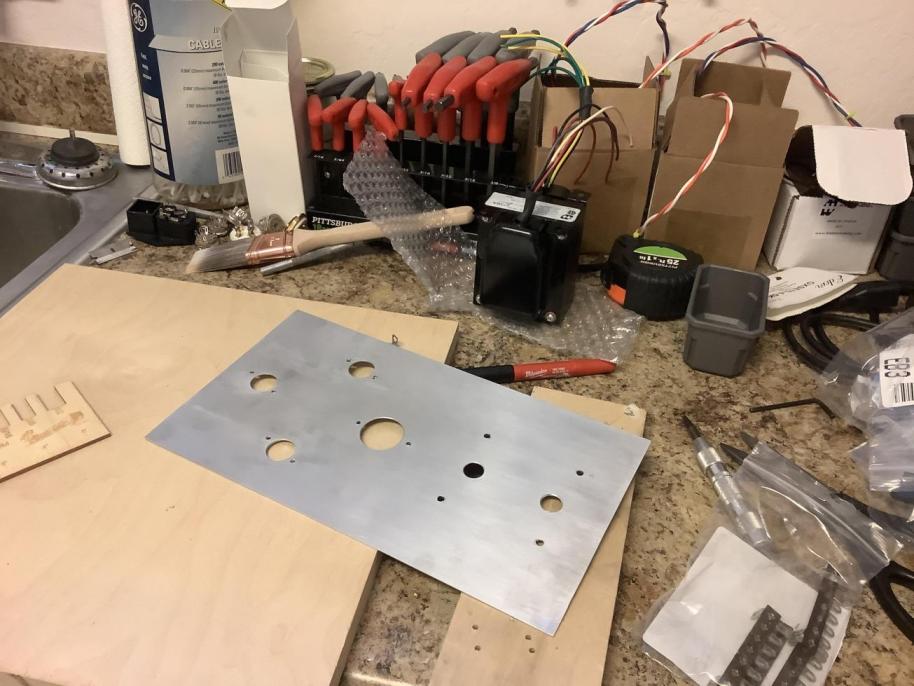
Here's the the beginning of the audio circuit with heavy ground bus bar:
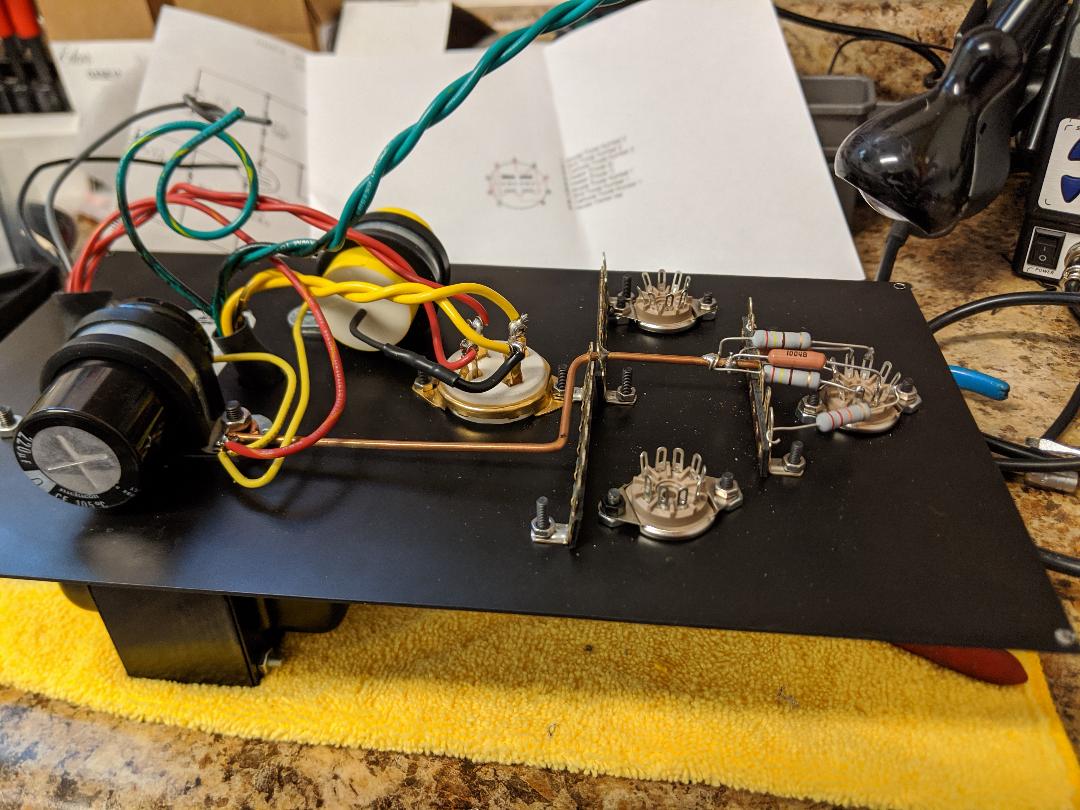
Next was to carefully layout the heater wiring, with at least six turns per inch.:
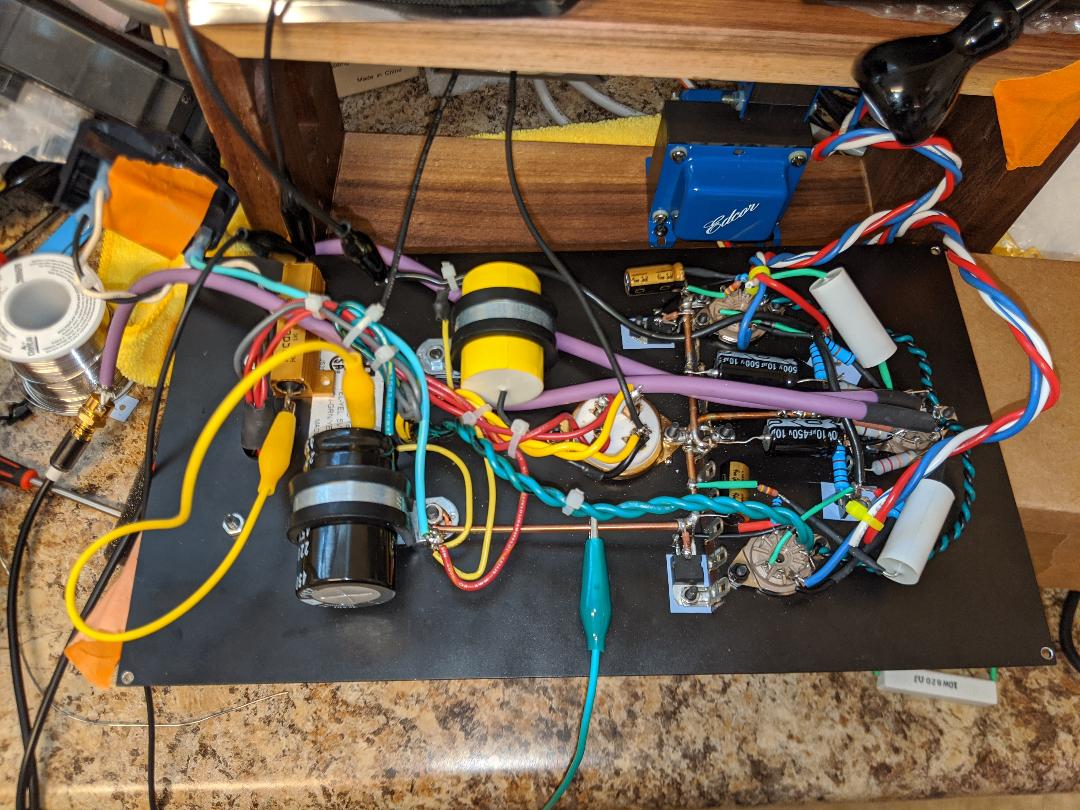
The base was made from Black Walnut sourced very inexpensively from Ebay. I chamfered the edges to protect against shop "rash" and used my standard and anyone-can-apply-it General Finishes wipe on poly. You simply wipe the product onto the prepared surface, and wipe off the excess, doing so several times creates a beautiful wax finish, with lots of grain pop and depth and no glossy hardness!
The base housed both the very large choke for the Pi filter and Edcor 10w, 5k, 4ohm OPTs. This product is a bargain, and I would argue is as good as exotic output transformers for one main reason: very low primary inductance. Please read this article:
A Consequence of The Quest for 20Hz Roll Off | Cascade Tubes
The completed amplifier:
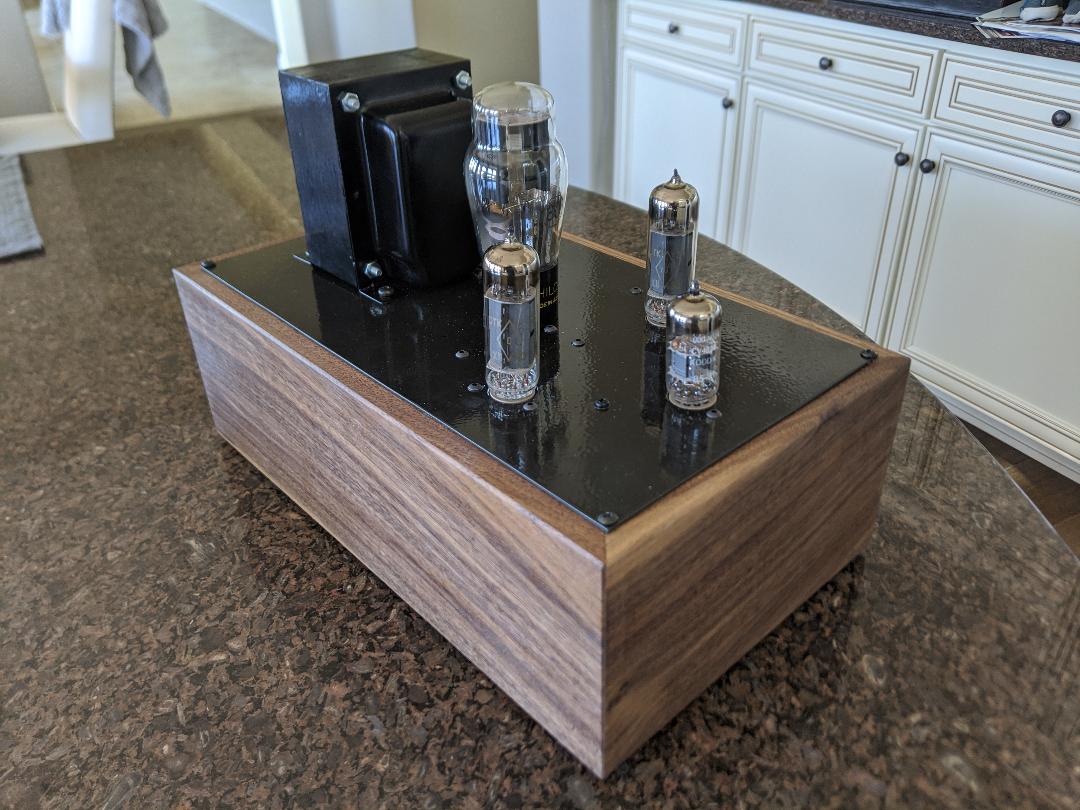
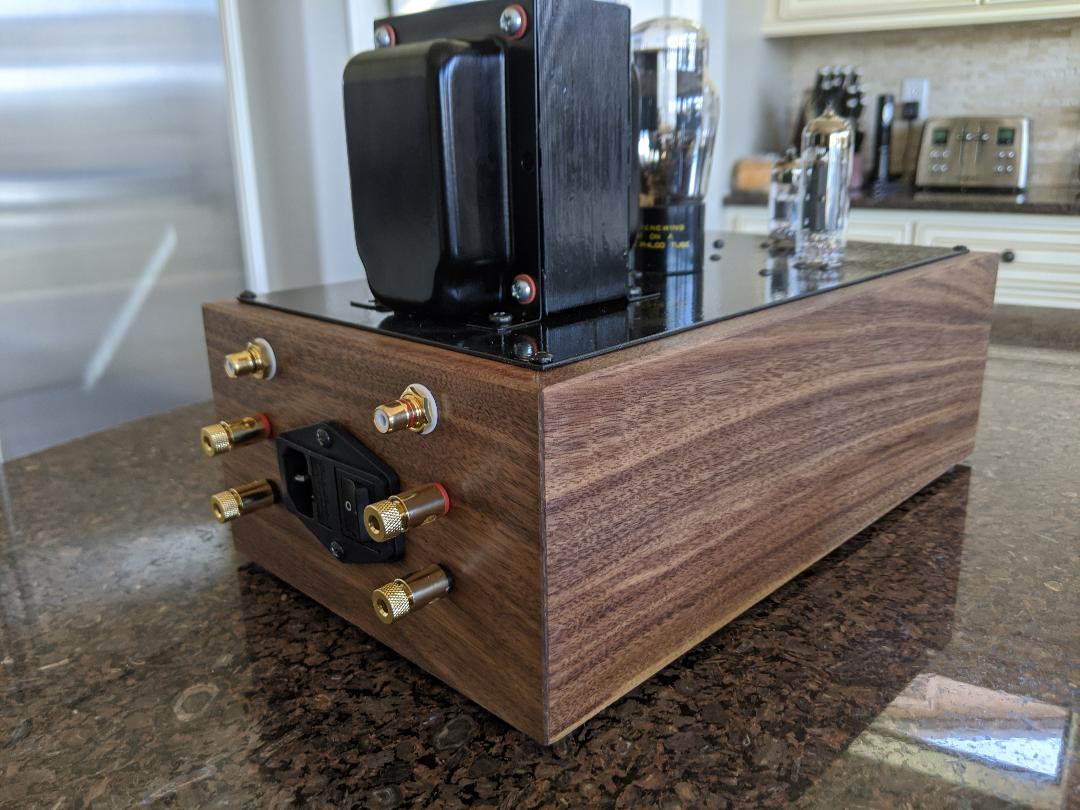
The only exotic thing I used that could not be ordered from Mouser was Cardas Star quad. This shielded assembly allows for very quit signal transmission.
Outputs tubes are Russian NOS 6p14p, which are supposed to be 5k hour tube. The driver is a Mullard CV4024.
How does it sound? (as you rapidly scroll past my boring prose)? In a word: fabulous. My loudspeaker employs a powered woofer and presents a very easy load for flea-watt amplifiers. Therefore, the amp presents a huge, top to bottom and left to right image. Everything I've read about EL84s being compressed has not been true of this amplifier / speaker combination: the RH84 presents a visible layer of elements with excellent depth. Pockets of individual instruments appear and then step back into darkness.
Tube amps remind me of seeing a play: actors appear in the room and then exit. That is exactly what this amplifier does. Believe me when i tell you that not every amplifier I connect to this speaker does this: I've heard lots of lifeless and flat presentations. My reference is a SET 6B4G that I have modified. How does it compare? It's awfully close. So close, that that psychological thing that happens to us when we listen to a particular piece of gear occurs: after listening for awhile you simply enjoy listening and stop thinking about building something better! Also, it's different then the 6B4G: it's cleaner from mid to top. The 6B4G is stronger in low frequency extension. So, there's always trade offs. However, with my corrected for the room subwoofer, I'm not missing a lot of low end at all with this amp. In fact, running the system without the sub only leaves the very lowest music information out of presentation.
Nothing sounds as good as a direct heat triode, but DHT tubes are scarce and expensive. So, I love that this sounds awfully close for way less $$.
If you want to build this amp, please reach out and I will gladly help you make the journey.
Cheers,
Greg
Equipment:
Speakers: Martin Logan Montis
Sub: SVS 13" subwoofer
Dac: DIY TDA1541 with hybrid SS to 5687 cathode follower I/V
Music source: Tidal->Roon->Euphony Stylus
There are two official versions of this amp: I built the newer, second version which employs an LM317 cathode bias scheme and the grid resistor being replaced by 21v zener. I do plan on swapping the zener with 3w power R to hear the difference.
There are a couple of BOMs posted online, so you can do a quick Google search to find those. Just beware that one BOM will be version 1 and another for version 2.
I chose the direct heated Type 80 (5y3 equivalent in a UX4 pin base) for several reasons: I buddy gave me some (Thanks Dr. Steve Curry!) and they have a high anode impedance, which may lead to a quieter supply, hence a better sounding supply. Also, I think the ST bottle is really cool looking and it's 1920's technology, with the design really beginning in late '23 and finalized as the 280 in 1927.
There's a lot of disagreement on the forums regarding types of supply and components. I won't get into that here, but the supply with the Type 80 rectifier turned out to be incredibly quite. Therefore, a quieter supply would absolutely contribute to a better sounding amplifier.
The are two downsides of the Type 80: it dissipates a very large amount of energy, making it incredibly inefficient. Therefore, you need to consider the heat output in your layout or how that will work in your environment. Living in Arizona this is a factor. I do run a very quiet ceiling fan in my audio room that helps tremendously during summer months, however, this will end up being a winter amplifier. I needed to use PSUD and get some advice on Vdrop: The Type 80 has a very high voltage drop (at least 60vdc), hence lower power output. I chose an over-sized Hammond 273BX, which has 700Vac center-tapped secondaries. I think that 650Vac center-tapped would have been just adequate. I did have to reduce my B+ some 45 volts. In any case, the RH84 circuit presents approx. 100mAh load, therefore, there was plenty of current delivery for the audio circuit!
During this time period, I read Morgan Jone's book and I highly recommend it, it's a fabulous read. I've built a lot of SS amps, but this was my first tube amp from scratch. So, I needed some help!
The top plate was just scrap metal, holes were perfectly opened with a cheap stepped bit that I've used for lots of projects. The bottom of the plate was cera-coated to prevent unwanted grounding (not really necessary but buddy offered). The top was sprayed with my time honored method of finishing metal: self-etching primer shot from a rattle can, sanded, shot again, to fill scratches in imperfections in the metal. Then rattle canned with Rustoleum Hammered finish. This stuff is awesome, and even in sunlight you see no imperfections. My 3rd coat is always a heavy wet coat that floats the hammered flake really nicely. I always allow this paint to dry for at least a week. The drying time is critical an it's also critical that you shoot quick enough to burn subsequent coats into one another. Otherwise, I wait at least 48 hours to shoot another coat. Otherwise, even after 100,000 years, underlying coats will still be wet!
Here's the the beginning of the audio circuit with heavy ground bus bar:
Next was to carefully layout the heater wiring, with at least six turns per inch.:
The base was made from Black Walnut sourced very inexpensively from Ebay. I chamfered the edges to protect against shop "rash" and used my standard and anyone-can-apply-it General Finishes wipe on poly. You simply wipe the product onto the prepared surface, and wipe off the excess, doing so several times creates a beautiful wax finish, with lots of grain pop and depth and no glossy hardness!
The base housed both the very large choke for the Pi filter and Edcor 10w, 5k, 4ohm OPTs. This product is a bargain, and I would argue is as good as exotic output transformers for one main reason: very low primary inductance. Please read this article:
A Consequence of The Quest for 20Hz Roll Off | Cascade Tubes
The completed amplifier:
The only exotic thing I used that could not be ordered from Mouser was Cardas Star quad. This shielded assembly allows for very quit signal transmission.
Outputs tubes are Russian NOS 6p14p, which are supposed to be 5k hour tube. The driver is a Mullard CV4024.
How does it sound? (as you rapidly scroll past my boring prose)? In a word: fabulous. My loudspeaker employs a powered woofer and presents a very easy load for flea-watt amplifiers. Therefore, the amp presents a huge, top to bottom and left to right image. Everything I've read about EL84s being compressed has not been true of this amplifier / speaker combination: the RH84 presents a visible layer of elements with excellent depth. Pockets of individual instruments appear and then step back into darkness.
Tube amps remind me of seeing a play: actors appear in the room and then exit. That is exactly what this amplifier does. Believe me when i tell you that not every amplifier I connect to this speaker does this: I've heard lots of lifeless and flat presentations. My reference is a SET 6B4G that I have modified. How does it compare? It's awfully close. So close, that that psychological thing that happens to us when we listen to a particular piece of gear occurs: after listening for awhile you simply enjoy listening and stop thinking about building something better! Also, it's different then the 6B4G: it's cleaner from mid to top. The 6B4G is stronger in low frequency extension. So, there's always trade offs. However, with my corrected for the room subwoofer, I'm not missing a lot of low end at all with this amp. In fact, running the system without the sub only leaves the very lowest music information out of presentation.
Nothing sounds as good as a direct heat triode, but DHT tubes are scarce and expensive. So, I love that this sounds awfully close for way less $$.
If you want to build this amp, please reach out and I will gladly help you make the journey.
Cheers,
Greg
Equipment:
Speakers: Martin Logan Montis
Sub: SVS 13" subwoofer
Dac: DIY TDA1541 with hybrid SS to 5687 cathode follower I/V
Music source: Tidal->Roon->Euphony Stylus
Last edited:
Very nice! I do want to make this amp, coincidentally I'm planning out making a different EL84 SET the Decware Zen this very week. I did look into the RH too. Others here were kind enough to go through the Zen schematic errors. I may make both! I'll take anyone up on an offer to help! Just need to find more time. Initially I have some Klipsch RP600 speakers with subwoofer for a two watter like this. The specs of the Klipsch are dubious they say 96db but independent labs say it's more like 89db. Eventually I want to make some big 15 inch full range Audio Nirvana 8 cubic foot cabinets.
Last edited:
Very nice. Glad you decided to build it and see for yourself what the RH84 sounds like.
What output transformers did you use? I see an edcor but only one so thought that might be a choke?
What output transformers did you use? I see an edcor but only one so thought that might be a choke?
Bas,
I used Edcor 10w-5k-4s and a Hammond 125mAh choke for the Pi filter.
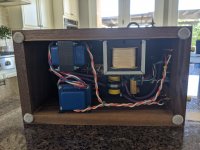
Yea, the RH84 is really, really good. I need to get some Ei Yugoslavia (Tungsram design) or just same Tungsram EL84s..
This is a super easy, great first amp, very well rounded design to build for low $.
I'm going to build the BH EL84 P-P, sot that will be fun too, but I've got another build coming first.
Cheers,
Greg
I used Edcor 10w-5k-4s and a Hammond 125mAh choke for the Pi filter.

Yea, the RH84 is really, really good. I need to get some Ei Yugoslavia (Tungsram design) or just same Tungsram EL84s..
This is a super easy, great first amp, very well rounded design to build for low $.
I'm going to build the BH EL84 P-P, sot that will be fun too, but I've got another build coming first.
Cheers,
Greg
For a good comparison, and for a backup:
Purchase a pair of matched Pentode EL84 tubes from Eurotubes.com (USA)
They re-test many specs after they arrive from JJ in Slovakia.
I know all of them there, have driven there several times to get my tubes.
I know the test designer there; and also a former co-worker of mine who designed and built some of the additional test equipment too.
I get all my tubes from them; all of the early JJ production runs are long since gone.
The quality is superb.
Try them out.
Purchase a pair of matched Pentode EL84 tubes from Eurotubes.com (USA)
They re-test many specs after they arrive from JJ in Slovakia.
I know all of them there, have driven there several times to get my tubes.
I know the test designer there; and also a former co-worker of mine who designed and built some of the additional test equipment too.
I get all my tubes from them; all of the early JJ production runs are long since gone.
The quality is superb.
Try them out.
Last edited:
Bas,
I used Edcor 10w-5k-4s and a Hammond 125mAh choke for the Pi filter.
View attachment 861429
Yea, the RH84 is really, really good. I need to get some Ei Yugoslavia (Tungsram design) or just same Tungsram EL84s..
This is a super easy, great first amp, very well rounded design to build for low $.
I'm going to build the BH EL84 P-P, sot that will be fun too, but I've got another build coming first.
Cheers,
Greg
EI-Nis tubes were not designed according to Tungsram's models but directly according to Philips and were made on Philips machines that arrived from the Netherlands in the 1950s when the factory was founded.
Nice looking build. I've been pretty high rotation on amps over the years, but have held on to my RH84 for 10 years now. Just my opinion, but this circuit does warrant getting good output iron if you can(I used Sony R2R made by Tango). Also, I've rolled just about every tube I can find through it and I can tell you that Alex's insistence on using a good 6201 for input is not wasted effort. Also, after many EL84's my fave is the Seimens rX4. Greg, swap the 6P14P for some Seimens, if you can. I love this amp and will probably never sell it.
Last edited:
I will see if I can get some Siemens. I have tried a number of European tubes in it and I still like the “K” variant of the 6P14P, it’s very musical in comparison to the standard flavor, which is a bit sterile and hard. Whereas the “K” is just diffuse and smooth without sounding syrupy and has plenty of bite at the same time.
Yes, I agree, the amp is a keeper.
Cheers,
Greg
Yes, I agree, the amp is a keeper.
Cheers,
Greg
Hi Greg
Very nice looking amp.
I had never heard about the K version of the 6P14P.
Tons of seller on eBay but who to trust...could you please provide a link here or by PM.
The RH84 was my first tube amp, nice memories..
Thanks
Eric
Very nice looking amp.
I had never heard about the K version of the 6P14P.
Tons of seller on eBay but who to trust...could you please provide a link here or by PM.
The RH84 was my first tube amp, nice memories..
Thanks
Eric
Looks like a really Nice build! Still going strong? What speakers is it running?
I’m considering a similar as a first tube amp build.
Can anyone recommend these OT from Piemme?
https://shop.piemme-elektra.it/Products/8104
Best regards Thomas
I’m considering a similar as a first tube amp build.
Can anyone recommend these OT from Piemme?
https://shop.piemme-elektra.it/Products/8104
Best regards Thomas
I have no experience. But did a search on this forum:
Tbey seem to be well regarded.
Hello all,
any info for Piemme interstages are welcome. Sound quality, etc. Thank you.https://shop.piemme-elektra.it/categories/373/products/8690
any info for Piemme interstages are welcome. Sound quality, etc. Thank you.https://shop.piemme-elektra.it/categories/373/products/8690
- folio
- Replies: 15
- Forum: Tubes / Valves
Tbey seem to be well regarded.
Thank you, how stupid of me, i could have done the search myself! 🙄 I was just amazed by the price.Tbey seem to be well regarded.
Will this be suitable as Power transformer?
https://shop.piemme-elektra.it/Products/6849
In use with 5AR4 rectifier..
Just clearing before placing 200€ order 😄
In rereading this thread I was wondering if OP (@ggetzoff) have any comments on the sound of the RH84 versions wrt screen grid connection via resistor vs zener.I built the newer, second version which employs an LM317 cathode bias scheme and the grid resistor being replaced by 21v zener. I do plan on swapping the zener with 3w power R to hear the difference.
@Francois G
I've done some tests on instrument amps, not on this specific amp, but generally speaking the zener (I use a bleed resistor to guarantee 1mA across the zener to ground) sounds more stable than the resistor: the screen voltage is constant even when secondary emission occurs, while with the resistor the voltage drop changes when the screen asks more current. A lower voltage on screens, modulated by the volume of the amp, creates some compression that can be tailored for instrument amplification, but sounds bad in hi-fi.
I've done some tests on instrument amps, not on this specific amp, but generally speaking the zener (I use a bleed resistor to guarantee 1mA across the zener to ground) sounds more stable than the resistor: the screen voltage is constant even when secondary emission occurs, while with the resistor the voltage drop changes when the screen asks more current. A lower voltage on screens, modulated by the volume of the amp, creates some compression that can be tailored for instrument amplification, but sounds bad in hi-fi.
- Home
- Amplifiers
- Tubes / Valves
- RH84 with Type 80 build and review
